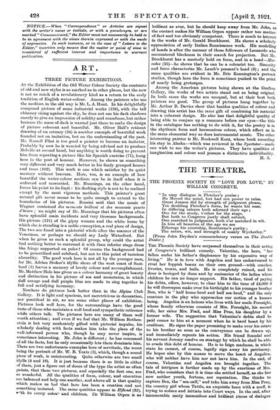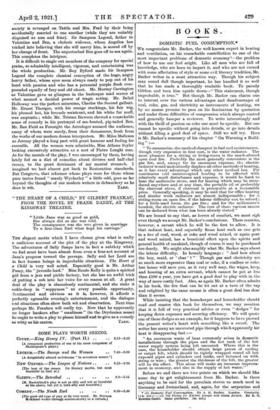THE THEATRE.
THE PHOENIX SOCIETY IN " LOVE FOR LOVE," BY WILLIAM CONGREVE.
" In easy dialogue is Fletcher's praise ; He Moved the mind, but had not power to raise.
Great Janson did by strength of judgment please, Yet doubling Fletcher's force, he wants his ease.
In differing talents both adorned their age ; One for the study, t'other for the stage. But both to Congreve justly shall submit, One matched in judgment, both o'er matched in wit. In him all beauties of the age we see Etherege his courtship, Southerne's purity ; The satire, wit, and strength of manly Wycherley."
[From John Dryden's commendatory verses on The Double Dealer.]
THE Phoenix Society have surpassed themselves in their acting of Congreve's brilliant comedy. Valentine, the hero, " has fallen under his father's displeasure by his expensive way of
living." He is in love with Angelica and has endeavoured to rival her foppish beaux on their own ground—with coaches, liveries, treats, and balls. He is completely ruined, and his door is besieged by duns and by emissaries of the ladies whose
children he can no longer support. His father, tired of paying his debts,, offers, however, to clear him to the tune of £4,000 if he will thereupon make over his birthright to his younger brother
Ben, who is " half home-bred and half sea-bred," and the only creature in the play who approaches our notion of a human being. Angelica is an heiress who lives with her uncle Foresight, whose family otherwise consists of Mrs. Foresight, his second wife, her sister Mrs. Frail, and Miss Prue, his daughter by a former wife. The suggestion that Valentine's debts shall be paid comes to him at a moment when he is hard beset by his creditors. He signs the paper promising to make over his estate to his brother as soon as the conveyance can be drawn up, and immediately repents his action. His friend Scandal and his servant Jeremy resolve on strategy by which he shall be able to evade this debt of honour. He is to feign madness, in which state he cannot, of course, legally sign away his patrimony.
He hopes also by this means to move the heart of Angelica, who will neither have him nor not have him. In the end, of course, Valentine and Angelica are brought together. The tale of intrigues is further made up by the exertions of Mrs. Frail, who considers that it is time she settled herself, as she has now neither youth, fortune, nor reputation. She thinks to
capture Ben, the " sea-calf," and take him away from Miss Prue, the country girl whom Tattle, an exquisite beau with a muff, i3 trying to seduce and initiate into Court ways. In the end, after
innumerable nasty innuendoes and brilliant Pieces of dialogue society is revenged on Tattle and Mrs. Frail by their being accidentally married to one another (while they are suitably disguised as nun and friar). Sir Sampson Legend, father to Valentine and Ben, a choleric widower, whom Angelica has tricked into believing that she will marry him, is scored off by her change of front. The unperturbed Ben goes off to sea again. This completes the intrigues.
It is difficult to single out members of the company for special praise, so admirably intelligent, vigorous, and entertaining was the whole production. Mr. Roy Byford made Sir Sampson Legend the complete classical conception of the huge, angry heavy father, whose eyes seem always ready to pop out of his head with passion and who has a perennial purple flush com- pounded equally of fury and old claret. Mr. Murray Carrington as Valentine gave us glimpses in the burlesque mad scenes of what seemed a decided power of tragic acting. Mr. Baliol Holloway was the perfect saturnine, Charles the Second pliant. Mr. Ernest Thesiger, with his orange stockings, his fair wig, his plumed hat, his brocade waistcoat, and his white fur muff, was exquisite ; while Mr. Tristan Rawson showed a remarkable sense of comedy in his portrayal of sea-booted, pig-tailed Ben. Mr. Ben Field as Foresight the Astrologer amused the audience, many of whom were surely, from their demeanour; fresh from the works of our modern dream interpreters. Mr. Miles Malleson as Jeremy played a long part with great humour and feeling for ensemble. All the women were admirable, Miss Athene Seyler looking excessively attractive as a sort of Pietro Longhi nun. AB for the morals of the play, I was encouraged by them, having lately fed on a diet of comedies about divorce and half-clad revues, to the great detriment of my mental stomach. I imagined we had almost got back to Restoration standards. But Congreve, that reformer whose plays were for those whose pure tastes found " manly Wycherley " a little odd, goes as far beyond the thoughts of our modern writers in debauchery as he



































 Previous page
Previous page